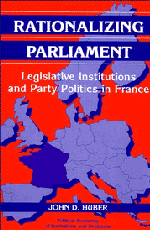Book contents
- Frontmatter
- Contents
- Series editors' preface
- Acknowledgments
- Introduction
- Chapter 1 Parliamentary government in the Fifth Republic
- Chapter 2 Choosing institutions
- Chapter 3 Restrictive procedures and policy conflict
- Chapter 4 Restrictive procedures and bargaining among parties
- Chapter 5 The confidence vote procedure and electoral politics
- Chapter 6 Electoral politics, procedural choice, and the French budget
- CHAPTER 7 Institutional arrangements, political parties, and parliamentary democracy
- Notes
- References
- Index
CHAPTER 7 - Institutional arrangements, political parties, and parliamentary democracy
Published online by Cambridge University Press: 05 December 2011
- Frontmatter
- Contents
- Series editors' preface
- Acknowledgments
- Introduction
- Chapter 1 Parliamentary government in the Fifth Republic
- Chapter 2 Choosing institutions
- Chapter 3 Restrictive procedures and policy conflict
- Chapter 4 Restrictive procedures and bargaining among parties
- Chapter 5 The confidence vote procedure and electoral politics
- Chapter 6 Electoral politics, procedural choice, and the French budget
- CHAPTER 7 Institutional arrangements, political parties, and parliamentary democracy
- Notes
- References
- Index
Summary
There are many different types of institutional arrangements that constitutional engineers can select to influence how political parties resolve conflict. The chief architect of the Fifth Republic, Michel Debré, wanted to select institutional arrangements that would be particularly suited to ending the extraordinary cabinet instability of the Fourth Republic. To this end, he advocated a single-member district, plurality rule electoral law. This institutional arrangement, he believed, would lead to stable governments by creating homogenous, single-party majorities at election time.
French elites ultimately declined this path, however, not because they objected to using the electoral law to manufacture single-party majorities, but because General de Gaulle feared that specifying any electoral law could jeopardize ratification of the Constitution by the French people. The framers therefore chose an alternative institutional solution to the bargaining problems of the Fourth Republic. They placed in the Constitution legislative procedures that would ensure governmental control over policymaking and that would weaken opportunities for destabilizing electoral competition on the floor of parliament.
The package vote and the confidence vote procedure were among the most controversial of the new constitutional procedures. Since each of these institutional innovations permits a member of the government to make the final, take-it-or-leave-it policy proposal, deputies can do little to evade the effects of these provisions. Visceral rhetoric therefore often surrounds discussions of the package vote and the confidence vote procedure, both of which are frequently denounced as antidemocratic because they effectively eliminate amendment prerogatives by deputies.
- Type
- Chapter
- Information
- Rationalizing ParliamentLegislative Institutions and Party Politics in France, pp. 178 - 188Publisher: Cambridge University PressPrint publication year: 1996



